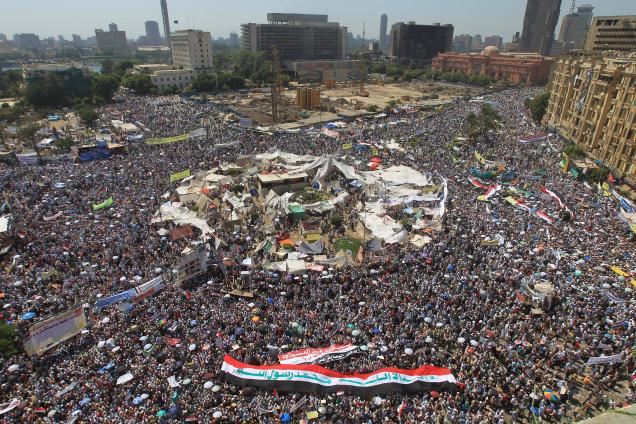“Liberal parties have struggled to find their footing in Egypt’s post-revolution political atmosphere due to inadequate time to form a loyal constituency,” said Rafik Hariri Center for the Middle East’s Visiting Fellow, Magdy Samaan, during a roundtable discussion moderated by Hariri Center Director, Michele Dunne, held on October 1. Elijah Zarwan, Senior Fellow for the European Council on Foreign Relations, echoed this point, saying that in contrast Islamist parties maintained a preexisting, cultivated constituency that easily translated into political support.
Examining the various coalitions and alliances being formed among the liberal political parties, the participants focused on the implications of this maneuvering on the drafting of the constitution, the prospects for new parliamentary elections, and the delicate US-Egyptian relationship. They also discussed the Islamists’ parties domination of the political sphere and its impact on Egypt’s democratic transition.
Analyzing the various political movements in Egypt, Samaan added that a societal tendency towards Islamists, who have a proven track record in providing aid to the poor, and a lack of international support continues to contribute to the liberal movement’s poor performance. Liberal parties remain personality driven as opposed to ideology driven, resulting in a clash for recognition within the liberal movement and a lack of unity that will likely hurt their chances in the upcoming polls.
The Islamist movement, however, remains a contested sphere with many political groups forming and adapting to challenge the Muslim Brotherhood. The Islamist proliferation will pull the political space to the right, affecting the outcome of the draft constitution. Some also remain concerned that with President Mohammed Morsi at the country’s helm and a high probability for Islamist domination in the next Parliament, Islamist control over state institutions already designed to serve the rulers will cause Egypt to stray into a new authoritarian era. Political allegiances, however, remain fluid and rapidly fluctuating public opinion may alter outcomes, depending on new developments.
Magdy Samaan, Magdy Samaan is a visiting fellow at the Rafik Hariri Center for the Middle East and a regular contributor to the EgyptSource blog based in Cairo. Mr. Samaan has previously worked as a correspondent for the Egyptian independent newspapers Al-Shorouk and Al-Masry al-Youm as well as Al Jazeera, reporting on politics, religious minorities, and US-Egypt relations. Samaan has also contributed to the Daily News Egypt and Cairo Times. He holds a degree in Mass Communications from Cairo University.
Elijah Zarwan, Prior to joining ECFR as a senior policy fellow, Elijah worked as a senior analyst for International Crisis Group, covering Egypt. He previously worked as the senior Middle East correspondent for DPA Deutsche Presse-Agentur, where he covered the Arab world, defined as Morocco to Iraq, minus Israel/Palestine. He has 13 years of experience as a journalist, editor and researcher, including stints as managing editor of Cairo Magazine, as a correspondent for France24, and as a researcher for Human Rights Watch, the Eurasia Group and Harvard University Law School, among others.
Photo Credit: AFP
Image: Tahrir.jpg
